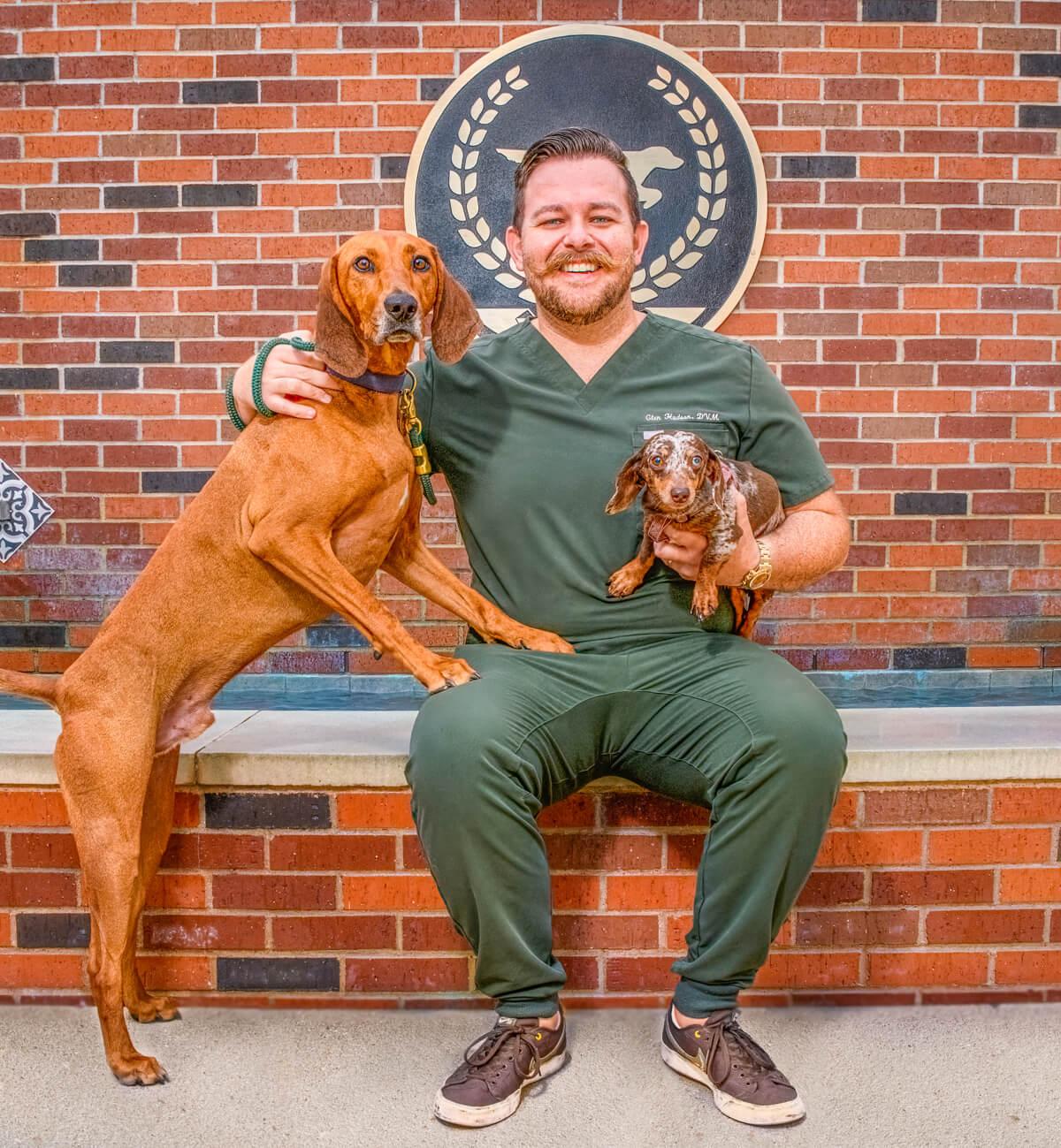Dog Vaccination Discussion with Veterinarians
What You Need to Know About Dog Vaccinations
Getting your dog vaccinated can improve the length and quality of your pet's life and also prevent some pretty awful diseases. It’s no wonder that, as a responsible pet parent, you turned to the internet with questions. At GeniusVets, we believe that pet care information should come from veterinarians and not from Dr. Google, as anyone with a computer can share information these days. That’s why we’ve taken frequently asked questions on dog vaccinations, sent these questions to renowned veterinarians across the U.S., and compiled their replies to get you useful information that you can trust.
While we've sourced all of the dog vaccination information and recommendations below directly from leading veterinarians across the country, please make sure to seek out the advice of your own veterinarian or find a trusted vet near you using the GeniusVets Directory.
What exactly are dog vaccinations?
Dog vaccinations are injections that dogs are given in a series, starting in the puppy stage and extending through adulthood. What types of vaccines and how many we give will depend on the dog's lifestyle and age. The purpose of the vaccine is to introduce tiny amounts of an inactivated virus particle that causes the body to create an immune response. This response allows the body to be protected so that if it were exposed to this bacteria or virus, the body would be able to mount an immune response and never become sick from that.
How do vaccinations impact the health and wellbeing of my dog?
Vaccinations are going to prevent your dog from getting some preventable diseases, diseases that may not cause severe illness but are still good to protect your dog from, and some diseases that can cause severe illness and death. Diseases like rabies, parvo, and distemper are potentially fatal and horrible for your dog to go through but also totally preventable, which is why we vaccinate your dogs.
Are dog vaccinations required by law?
The only vaccine that is required by law is rabies. And that is because it is a zoonotic disease (transmissible to humans), and it can be fatal for humans. We do want all dogs and cats vaccinated for rabies. Some states require both dogs and cats to vaccinate, while other states disregard dogs. Regardless, all dogs and cats should be vaccinated for rabies because it's contracted from many different wildlife forms such as bats and other mammals.
If your dog, cat, or ferret weren’t vaccinated for rabies and they were to bite an individual, you could be visited by the health department, required to quarantine, and possibly suffer other even more dire consequences.
Does my dog's lifestyle factor into what vaccinations my veterinarian will recommend?
Absolutely. There's a core set of vaccines that we recommend for all dogs—parvo, distemper, and rabies. But there are other vaccines that are more dependent on whether your dog goes to dog parks, dog boarding facilities, doggy daycare, dog groomers, and other things like that. With dogs that are around other dogs quite often, most veterinarians will recommend Bordetella, which is the kennel cough vaccine, and they may also recommend the flu vaccine. There are also geographic considerations. For example, in states where ticks are prevalent, your vet will likely recommend the Lyme Disease vaccine. And if you live near a lot of wildlife, they might also recommend the vaccine for leptospirosis, as that is also zoonotic and transmitted through the urine of wildlife, primarily rats.
How soon should I get my dog vaccinated?
We typically start vaccines at eight weeks of age as part of a puppy care regimen, although some breeders will have their pups vaccinated as early as six weeks. We start vaccinating for distemper, adenovirus and parvovirus, and Bordetella at that time. Part of that is because the puppy is beginning to lose maternal antibodies that the mom gave them, and they need to start building their own antibodies. But that's also why we have to booster vaccines—the dog is caught between the time where they have the maternal antibodies and their own antibodies.
Each vaccine after that comes at about three weeks intervals, with the last one being around four months when they can mount a long-term immune response. And then we give annual vaccines to help that puppy build upon that initial immunity. Some boarding facilities require Bordetella every six months, so you may need to adhere to those guidelines if you’re frequently boarding your dog.
Do I really need to avoid allowing my puppy to socialize with other dogs until they are fully vaccinated?
We typically don’t recommend socializing with any unknown animals or in places where a lot of unknown animals or wildlife may congregate, until your dog is vaccinated (3-4 weeks after the last vaccine is given). Most veterinarians will tell you, however, that you can socialize with your friends' and families’ dogs who you know to be healthy and vaccinated, as long as they aren't having diarrhea, vomiting, or exhibiting other symptoms of contagious diseases. It’s best to avoid dog parks and places where any dog may go and leave urine or feces behind, as those are places that viruses and bacteria can be carried. The potentially fatal parvovirus can live in an environment for years. Your dog may have some level of protection from the vaccines, but high levels of exposure may still make your puppy sick. In sum, your dog doesn’t necessarily have to be strictly isolated, but you do want to be careful about who you socialize with and where you go.
Taking your dog to puppy classes is generally safe, as long as none of the other puppies are having diarrhea, vomiting, or other symptoms of contagious disease. A good puppy class organizer will ensure that vaccinations are given by a veterinarian, as they are guaranteed, and that none of the dogs are showing signs of illness.
To reiterate, puppy vaccines should always be administered by a veterinarian. Those administered or sold by other corporations may not be temperature regulated. In a veterinary hospital, they're temperature regulated, guaranteed, and backed by multimillion-dollar companies.
Why is it important to avoid missing a dog vaccination?
Initial dog vaccines have to stimulate the immune cells, and then the boosters remind the immune cells of the disease that they need to be able to fight against. The initial puppy vaccinations that are done every few weeks are getting those cells ready to go, and then the boosters—done annually or every three years—are continuing to remind the immune cells of what they need to be on the lookout for.
As we know from research, vaccines only last so long, so it's incredibly critical that we stay on schedule. If you go much past that, then puppies are not completely covered, and they can pick up harmful diseases. It’s the same with adult dogs, but adult dogs can hold onto their immunity for a much longer time. It depends on the dog’s age and the situation, but we don't want to miss their vaccines.
What diseases are prevented with vaccinations?
Prevention is kind of a misnomer in the way that nothing is 100% preventable, but vaccinations most definitely increase your odds of providing immunity and prevention of certain diseases for your pet.
Some of the diseases vaccinations prevent are:
- Rabies is a fatal disease with no cure, so we definitely want to prevent rabies in our animals. It's also transmissible to humans. We give all of our companion animals rabies vaccines because we can't vaccinate wildlife.
- Distemper causes neurologic and respiratory conditions that can kill your dog.
- Parvovirus is a disease of the intestinal tract, causes severe vomiting and diarrhea, and again, can be fatal.
- Leptospirosis is a bacterial disease that dogs can pick up from infected water sources. Lepto is spread through the urine of the infected wildlife, so if the dog were to drink from a puddle and ingest that bacteria, they could contract leptospirosis, which causes liver and kidney failure. Leptospirosis is also transmissible to humans.
- Lyme disease, which is prevalent in the North and Northwest, can cause fever, lethargy, lameness, and in the long-term, it can also cause kidney failure.
- Finally, we have viruses and bacteria that can cause what we call kennel cough, which is a catchall term for upper respiratory infections that dogs can get from other dogs. We have Bordetella, Parainfluenza, Canine influenza virus, and H3N2 and H3N8, and these are all recommended for all who have contact with other dogs.
If we stop vaccinating for these diseases, they would all return and become prevalent again, which is why vaccinations are so critical.
What are the typical puppy and dog vaccination schedules?
For puppies, vaccinations start at about eight weeks and will be every three weeks until they're four months, and sometimes later than that, too, depending on certain factors. We may add leptospirosis on at the end, and that's a series of two the first year. We do the first distemper and Bordetella at eight weeks, following that with Distemper, Lyme. and leptospirosis at 12 weeks, Lyme and canine influenza at 14 weeks, and Lyme, canine influenza, distemper, and leptospirosis at 16 weeks. Then we do rabies the next year, then that goes to every three years, distemper every three years, and then everything else is an annual vaccine, again, to remind those immune cells.
The annual wellness exams are an opportune time to assess whether the dog needs additional vaccines, as things change for people. For example, your dog may not have been going out hunting with you initially, and then you decided they're going to be doing that. Because they’re now hunting, we may want to add in leptospirosis if they enter an area where that goes on.
What is a vaccine reaction?
A vaccine reaction is an allergic reaction to vaccines. Although it’s very rare, the immune system of some pets gets overstimulated by the vaccine. That can cause facial swelling, difficulty breathing, vomiting, diarrhea, or extreme lethargy. Again, this is very rare, and, as veterinarians, we feel like the benefits of vaccines far outweigh that risk. We also have good protocols in place for managing vaccine reactions if they do occur and to prevent them in the future for dogs who experienced them.
The AVMA also has a comprehensive guide to dog vaccinations you can check out for further reference, which is helpful if you are a new dog owner and need a guide to vaccinations. If you have any other questions about dog vaccinations, please ask your vet. If you don't have one yet, we can help you find a local veterinarian!




